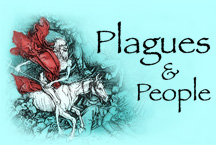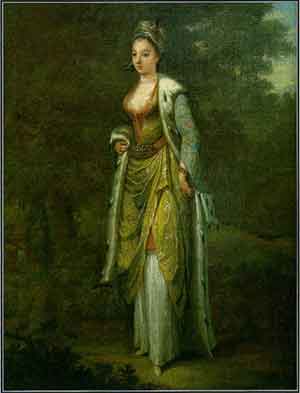| 1 April 1717
To her friend Sarah Chiswell, in England--
|
Lady Mary Wortley Montagu in Turkish Dress |
...Those dreadfull Storys you have
heard of the plague have very little foundation in Truth. I own I
have much ado to reconcile my selfe to the Sound of a Word which has allways
given me such terrible Ideas, thô I am convinc'd there is little
more in it than a fever, as a proffe of which we past through 2 or 3 Towns
most violently infected. In the very next house where we lay, in
one of 'em, 2 persons dy'd of it. Luckily for me I was so well deceiv'd
that I knew nothing of the matter, and I was made beleive that our 2nd
Cook who fell ill there had only a great cold. However, we left our
Doctor to take care of him, and yesterday they both arriv'd here in good
Health and I am now let into the Secret that he has had the Plague.
There are many that 'scape of it, neither is the air ever infected.
I am perswaded it would be as easy to root it out here as out of Italy
and France, but it does so little mischeife, they are not very solicitous
about it and are content to suffer this distemper instead of our Variety,
which they are utterly unacquanted with.
A propos of Distempers, I am going to tell you a thing, that I am sure
will make you wish your selfe here. The Small Pox so fatal and so
general amongst us is here entirely harmless by the invention of engrafting
(which is the term they give it).
There is a set of old Women, who make it their business to perform the
Operation. Every Autumn, in the month of September, when the great
Heat is abated, people send to one another to know if any of their family
has a mind to have the small pox. They make partys for this purpose,
and when they are met (commonly 15 or 16 together) the old Woman comes
with a nutshell full of the matter of the best sort of small-pox and asks
what veins you please to have open'd. She immediately rips open that
you offer to her with a large needle (which gives you no more pain than
a common scratch) and puts into the vein as much venom as can lye upon
the head of her needle, and after binds up the little wound with a hollow
bit of shell, and in this manner opens 4 or 5 veins.
The Grecians have commonly the superstition of opening one in the Middle
of the forehead, in each arm and on the breast to mark the sign of the
cross, but this has a very ill Effect, all these wounds leaving little
Scars, and is not done by those that are not superstitious, who chuse to
have them in the legs or that part of the arm that is conceal'd.
The children or young patients play together all the rest of the day
and are in perfect health till the 8th. Then the fever begins to
seize 'em and they keep their beds 2 days, very seldom 3. They have
very rarely above 20 or 30 in their faces, which never mark, and in 8 days
time they are as well as before their illness. Where they are wounded
there remains running sores during the Distemper, which I don't doubt is
a great releife to it.
Every year thousands undergo this Operation, and the French Ambassador
says pleasantly that they take the Small pox here by way of diversion as
they take the Waters in other Countrys. There is no example of any
one that has dy'd in it, and you may beleive I am very well satisfy'd of
the safety of the Experiment since I intend to try it on my dear little
Son [Edward].
I am Patriot enough to take the pains to bring this usefull invention
into fashion in England, and I should not fail to write to some of our
doctors very particularly about it if I knew any one of 'em that I thought
had Virtue enough to destroy such a considerable branch of their Revenue,
for the good of Mankind, but that Distemper is too beneficial to them,
not to expose to all their Resentment, the hardy wight that should undertake
to put an end to it. Perhaps if I live to return I may, however,
have courrage to war with 'em. Upon this Occasion, admire the Heroism
in the heart of your Friend....

|


